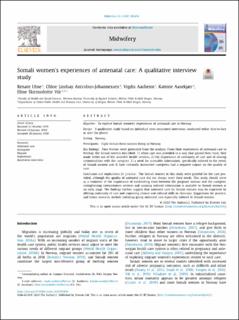| dc.contributor.author | Utne, Renate | |
| dc.contributor.author | Antrobus-Johannessen, Chloe Lindsay | |
| dc.contributor.author | Aasheim, Vigdis | |
| dc.contributor.author | Aasekjær, Katrine | |
| dc.contributor.author | Vik, Eline Skirnisdottir | |
| dc.coverage.spatial | Norway | en_US |
| dc.date.accessioned | 2021-02-10T09:16:05Z | |
| dc.date.available | 2021-02-10T09:16:05Z | |
| dc.date.created | 2020-07-29T13:11:19Z | |
| dc.date.issued | 2020 | |
| dc.identifier.citation | Utne, R., Antrobus-Johannessen, C. L., Aasheim, V., Aasekjær, K., & Vik, E. S. (2020). Somali women’s experiences of antenatal care: A qualitative interview study. Midwifery, 83. | en_US |
| dc.identifier.issn | 0266-6138 | |
| dc.identifier.uri | https://hdl.handle.net/11250/2727079 | |
| dc.description.abstract | Objective
To explore Somali women's experiences of antenatal care in Norway.
Design
A qualitative study based on individual semi-structured interviews conducted either face-to-face or over the phone.
Setting
Norway.
Participants
Eight Somali-born women living in Norway.
Key findings
Four themes were generated from the analysis. From their experiences of antenatal care in Norway, the Somali women described: 1) when care was provided in a way that gained their trust, they made better use of the available health services, 2) the importance of continuity of care and of sharing commonalities with the caregiver, 3) a need for accessible information, specifically tailored to the needs of Somali women and 4) how culturally insensitive caregivers had a negative impact on the quality of care.
Conclusion and implications for practice
The Somali women in this study were grateful for the care provided, although the quality of antenatal care did not always meet their needs. This study should serve as a reminder of the importance of establishing trust between the pregnant woman and the caregiver, strengthening interpretation services and assuring tailored information is available to Somali women at an early stage. The findings further suggest that antenatal care for Somali women may be improved by offering continuity of care and improving clinical and cultural skills in clinicians. Suggestions for practice, and future research, include initiating group antenatal care especially tailored to Somali women. | en_US |
| dc.language.iso | eng | en_US |
| dc.publisher | Elsevier | en_US |
| dc.rights | Navngivelse 4.0 Internasjonal | * |
| dc.rights.uri | http://creativecommons.org/licenses/by/4.0/deed.no | * |
| dc.subject | antenatal care | en_US |
| dc.subject | immigrant | en_US |
| dc.subject | migrant | en_US |
| dc.subject | experiences | en_US |
| dc.subject | qualitative interviews | en_US |
| dc.title | Somali women's experiences of antenatal care: A qualitative interview study | en_US |
| dc.type | Peer reviewed | en_US |
| dc.type | Journal article | en_US |
| dc.description.version | publishedVersion | en_US |
| dc.rights.holder | © 2020 The Author(s) | en_US |
| dc.source.pagenumber | 7 | en_US |
| dc.source.volume | 83 | en_US |
| dc.source.journal | Midwifery | en_US |
| dc.identifier.doi | 10.1016/j.midw.2020.102656 | |
| dc.identifier.cristin | 1820897 | |
| cristin.ispublished | true | |
| cristin.fulltext | original | |
| cristin.qualitycode | 1 | |

